
Tehran, Delhi Sign 15 Major Deals
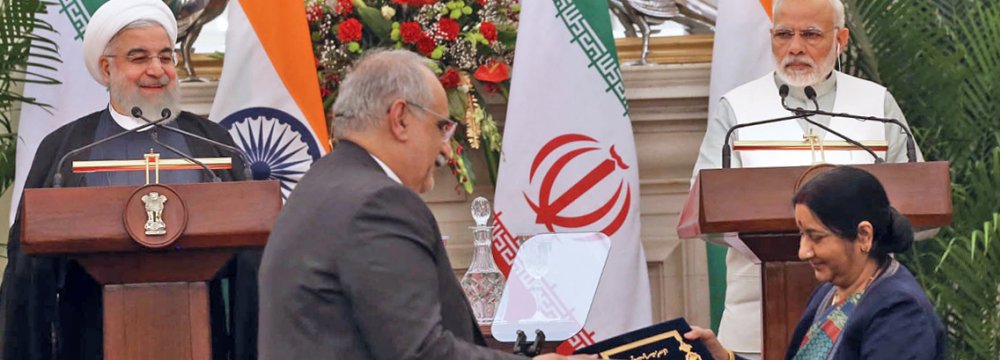
"Both leaders held substantive & productive discussion on cooperation in trade & investment, energy, connectivity, defense & security & regional issues," External Affairs Spokesman Raveesh Kumar tweeted.
Addressing a joint press event with Rouhani, Modi said the visit by the Iranian president shows how the two sides want to deepen cooperation in key areas, including connectivity, the Indian daily Business Standard reported.
The agreement on avoidance of double taxation "will stimulate flow of investment, technology and personnel from India to Iran and vice versa", India's Central Board of Direct Taxes said in a statement.
The pact provides for exchange of information between the two nations as per the latest international standards.
"It will improve transparency in tax matters and will help curb tax evasion and tax avoidance," the statement added.
Earlier in the day, Iran's Economic Affairs and Finance Minister Masoud Karbasian invited Indian businesses to invest in Iran and take advantage of the rapid economic growth of the country.
"We hope that by signing basic economic and trade agreement such as the avoidance of double taxation, supporting joint venture plans and promoting preferential tariff would enable companies to enter Iran with fewer obstacles," he said.
The Iranian leader arrived in India on Thursday for a three-day visit, his first since he came to power in 2013.
Chabahar Leased to Indian Company
A major deal signed between the two sides on Saturday was a lease agreement for the Shahid Beheshti Port at Chabahar. It was signed between Iran's Port and Maritime Organization and India Ports Global Limited.
Chabahar Port lies just 90 km from the China-sponsored Gwadar Port in Pakistan. The Chabahar project in southeastern Iran is significant, as it serves as a transit route linking India, Iran and Afghanistan bypassing Pakistan, Indian television media company NDTV reported on its website.
The agreement means Iran is leasing a part of the area of the multipurpose and container terminal for 18 months for the Indian side to take over operations of port facilities in the first phase of the port development project.
India has committed $85 million for the development of the Shahid Beheshti Port.
The first phase of the port was inaugurated by Rouhani in December last year, a little over a month after the first consignment of wheat from India to Afghanistan was sent via this facility.
Chabahar consists of two separate ports: Shahid Kalantari and Shahid Beheshti. The opening of the first phase of Shahid Beheshti Port (out of five phases defined for the project), which has tripled its capacity to 8.5 million tons (equal to that of all the northern ports of the country), will allow the docking of super-large container ships (between 100,000 DWT and 120,000 DWT).
India has routed a consignment of 1.1 million tons of wheat to Afghanistan through Chabahar Port.
During Modi's visit to Tehran in 2016, a trilateral agreement on transit and transport was signed between India, Iran and Afghanistan.
After holding talks with Rouhani in New Delhi, Modi in a joint address said, "We want to increase connectivity and trade; we want to strengthen our strong cultural ties. Landlocked Afghanistan has got a golden gateway in Chabahar ... Congratulate Iran for it."
Rouhani said India and Iran "have a good understanding on Chabahar ... and the two sides will see more cooperation on energy, gasoline and gas".
Afghanistan to Use Chabahar for Exports
Afghanistan plans to ship a consignment of fresh and dried fruit to India through Iran’s Chabahar Port for the first time in the first half of the next Afghan year starting March 21, Director General of Afghan Ministry of Commerce and Industries' Transit and Transportation Bureau Yahya Akhlaqi said.
According to Iranian Embassy officials in Kabul, among the 500 companies licensed to operate in Chabahar, 165 are Afghan, TOLOnews reported.
Afghanistan’s Ministry of Commerce and Industries said Iran has provided special privileges to Afghan investors at Chabahar.
“The problem of getting visas for Afghan investors to Iran has been solved and efforts are underway to provide further facilities to our investors,” Akhlaqi was quoted as saying earlier this month.
According to economic attaché at the Iranian Embassy in Kabul, Mohammad Reza Karimzadeh, Iran is offering an 80% discount in export tariffs and a 75% discount on import duties to Afghan traders using Chabahar.
"Masterstroke" to Safeguard Chabahar Deal
Indian companies will soon be able to invest in Iran using Indian currency, Indian news reports said on Friday, citing government sources. The decision, which was implemented last month to stimulate trade and investment between the two countries, according to Indian news agency Asian News International, was made public on the occasion of Rouhani's visit.
Describing the move as "a masterstroke to safeguard the Chabahar deal", Indian news website wrote on Saturday: "Keeping in mind the fragile Iran-US relations, and considering that western countries have had imposed restrictions on Iran in the past, barring it from dealing in dollars … allowing Indian companies to invest in Indian rupee would safeguard Indian projects in the crucial Chabahar Port (and in Iran) from any similar restrictions in the future."
Allowing the Indian rupee in Iran also allows India to overcome the banking limitations in Iran, it added.


Uzbek gold miner said to eye $20 billion value in dual listing

Peabody–Anglo $3.8B coal deal on the brink after mine fire

A global market based on gold bars shudders on tariff threat

Minera Alamos buys Equinox’s Nevada assets for $115M

Adani’s new copper smelter in India applies to become LME-listed brand

OceanaGold hits new high on strong Q2 results
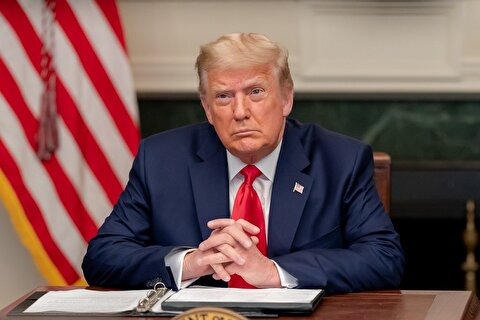
Trump says gold imports won’t be tariffed in reprieve for market

Cochilco maintains copper price forecast for 2025 and 2026

De Beers strikes first kimberlite field in 30 years

BHP shares near priciest valuation since 2021 on shift to miners

African Rainbow boosts Surge Copper stake to 19.9%
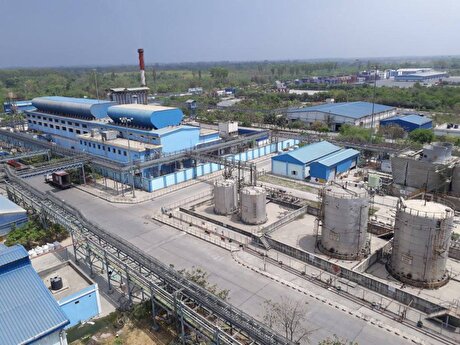
Hindustan Zinc to invest $438 million to build reprocessing plant
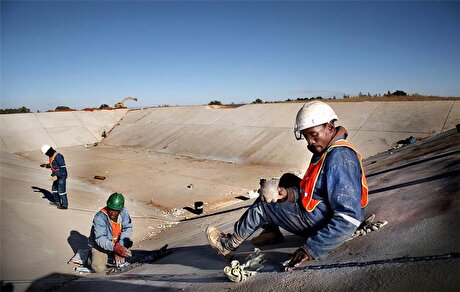
South Africa mining lobby gives draft law feedback with concerns

Wooden church sets off on slow Swedish road trip to escape mining subsidence

Harmony Gold’s MAC Copper takeover gets regulatory nod

Povrly Copper Industries orders a breakdown rolling mill for high-quality copper, brass, and bronze strip production

Advanced cold-rolled strip for China’s New Energy Vehicle market
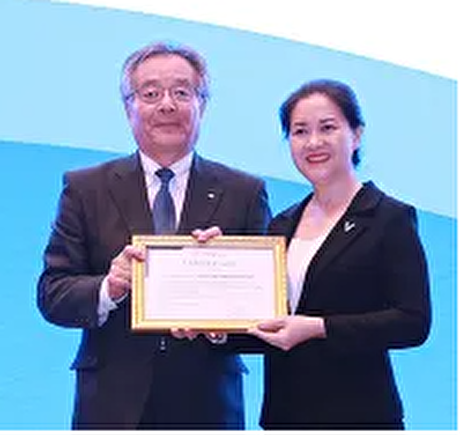
A Danieli greenfield project for competitive, quality rebar production
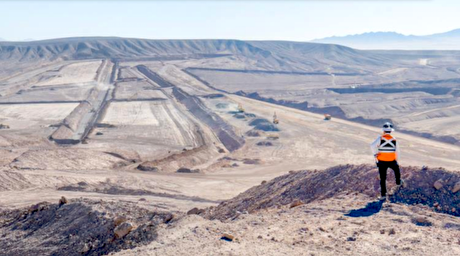
Antofagasta posts biggest profit margins since 2021

BHP shares near priciest valuation since 2021 on shift to miners

African Rainbow boosts Surge Copper stake to 19.9%

Hindustan Zinc to invest $438 million to build reprocessing plant

South Africa mining lobby gives draft law feedback with concerns

Wooden church sets off on slow Swedish road trip to escape mining subsidence

Harmony Gold’s MAC Copper takeover gets regulatory nod

Povrly Copper Industries orders a breakdown rolling mill for high-quality copper, brass, and bronze strip production

Advanced cold-rolled strip for China’s New Energy Vehicle market

A Danieli greenfield project for competitive, quality rebar production














